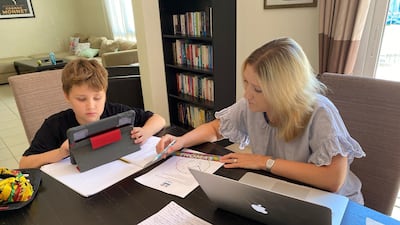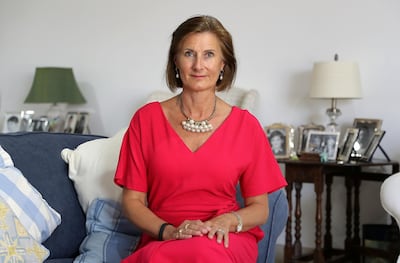A prolonged period of e-learning that could stretch until 2021 has led some parents to consider pulling their children out of school and pursuing traditional homeschooling.
Families with young children said they may attempt to teach a basic curricula themselves rather than pay as much as Dh60,000 per year in primary school fees.
Some said boarding schools abroad were another option - though it remains unclear how long disruption to aviation and periods of quarantine for travellers may last.
The UAE's education authorities have yet to decide how pupils would be taught next term after three months of distance learning due to the virus outbreak. Schools across the country have said they are preparing for e-learning to carry on to September and possibly into 2021.
Samantha Armstrong, a British mother with a nine-year-old son in school, said distance learning with relatively minimal contact with teachers was no substitute for in-class lessons.
“There are so many limitations to the online learning model,” said Ms Armstrong, 39, a media consultant who lives in Dubai.
“In a crisis situation what they did was fantastic but it does not work as a long-term solution. If online education continues it will affect the quality of learning."
She said parents would struggle if they had to return to work but could not send their children to school full time in September.
The best case scenario, officials and headteachers said this week, would be pupils in class 70 per cent of the time and learning from home for 30 per cent. If the Covid-19 outbreak is not under control by September, 100 per cent of classes may be taken at home.
Ms Armstrong said if e-learning must continue in September then schools should further reduce tuition fees.
While homeschooling and forms of parent-taught online education has gained popularity, the vast majority of parents in the UAE send their children to brick and mortar schools.
More than one million children attend 1,262 private and public schools, and only a handful of parents opt for to teach their children at home.
Earlier this month, The National reported online schools and home education services had seen a surge in popularity after schools moved to distance learning.
Abir Saud, 37, a mother of three in Dubai, said she also hoped schools would reopen in a few months, after struggling to stay on top of her children’s studies alone.
“My husband was stuck in Riyadh due to the lockdown and it took me time to ground myself and stay positive," said Ms Saud, who is British.
“My mental health cannot take this any more.
“My twins will be in foundation stage 2 next year, and it will be impossible for me to homeschool them. I feel they will suffer a lot because of this."
Homeschooling is not prohibited or regulated by the UAE's authorities.
Emiratis who choose to teach their children at home must show they are meeting certain educational requirements, while expats do not.
Pupils are also not required to be accredited to a curriculum but a parent can decide to choose one.
Critics of homeschooling claim the quality of the education taught by parents may vary considerably, and that in some cases forms of abuse that could have been spotted by a teacher could go unnoticed.
But the Dubai and Northern Emirates Homeschool Association, a home-schooling support group, said it has received a barrage of requests from parents in the past week.
Michaela Cooper, an American mother of five and co-founder of the association, said parents were interested in knowing what was involved.
“I definitely do anticipate an increase in parents choosing to homeschool for the next academic year,” Ms Cooper said.
Fiona McKenzie, from Carfax Education in Dubai, an education consultancy that provides tutoring, said families were looking at alternatives.
"We have also seen a spike in inquiries for British boarding schools as your child will be in a stable environment where the quality of education is high," she said.
Parents who were unhappy with how their child's school dealt with the pandemic were likely to move schools.
“There are key transition points we are finding parents are concerned about, for example if children are in Grade 11 and will transition to exam years," Ms McKenzie said.
“When parents are being asked to register for next year they are asking, 'what am I paying for? I don’t know what I am committing to at this stage'."
Despite evidence of a spike in homeschooling, most parents said they wanted to see their children back in classrooms, even if it has to be done in phases.
Victoria Uriz, an auditor at a health insurance company with two children aged between 4 months and 3 years, said she struggled to get her eldest to focus.
“Our house is not a school and it’s not easy to make a child sit in front of a television and teach him," said Ms Uriz, 38, from Spain.
"For him it's very difficult to understand that I am his teacher and not his mum at that time.
“If this continues when he will be in the primary section, I will try to ask my organisation to shift me to another country.
“I paid for an English-speaking school because I want my son to learn English. My accent is not good."
Emma West, a British mother, said that the longer distance learning continued, the more concerned she was for her daughter’s development.
"Children need to go back. Even if they split the class and go on alternate days," said Ms West, 41.
"My daughter has sensory processing issues and is falling behind.
"Not being in her classroom environment with her teacher and peers working towards the same goals is causing havoc for her.
"She needs the routine of her classroom."



